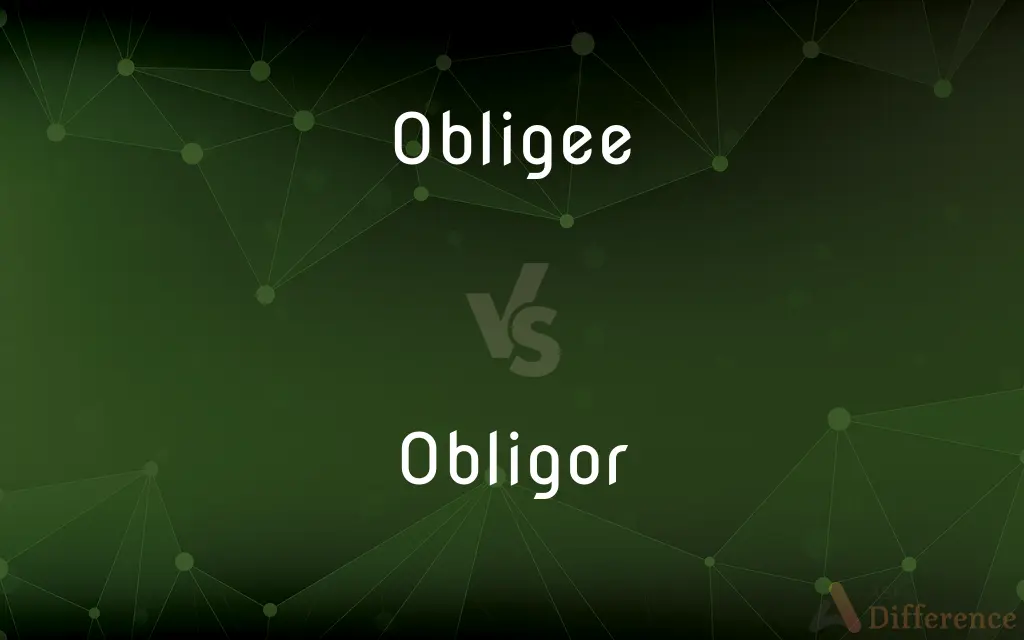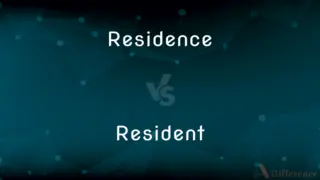Obligee vs. Obligor — What's the Difference?
By Tayyaba Rehman — Updated on November 6, 2023
An obligee is the individual or party who is entitled to receive a service or sum, while an obligor is the one legally required to provide it.

Difference Between Obligee and Obligor
Table of Contents
ADVERTISEMENT
Key Differences
An obligee is the beneficiary in a legal agreement, to whom the obligor owes a debt or duty. The obligee holds the right to demand the fulfilment of the obligation. In a contract, the obligee is the party protected by the agreement and is entitled to receive what has been promised.
The obligor, conversely, is the party that must fulfill the obligation. This could involve paying a sum of money, performing a service, or delivering a good. In the context of child support, the obligor is the parent who must make payments, and the obligee is the custodial parent or guardian who receives the payments.
These terms are not interchangeable; one indicates the party receiving a benefit (obligee), while the other refers to the party that must provide the benefit (obligor). These roles are fundamental to any contractual relationship and are defined by the nature of the agreement.
In legal proceedings, the court may enforce these roles, ensuring that the obligor fulfills their commitments to the obligee. For instance, if an obligor fails to pay alimony, the obligee may take legal action to enforce the agreement.
Comparison Chart
Definition
The party entitled to a benefit
The party responsible to provide a benefit
ADVERTISEMENT
Role in Agreement
Receiver or beneficiary
Payer or provider
Example
Loan recipient
Loan payer
Legal Action
May receive enforcement
May be subject to enforcement
In Context of Debt
Creditor
Debtor
Compare with Definitions
Obligee
The recipient of an obligation.
As the obligee, she awaited the monthly rent payments.
Obligor
One who is bound to another by contract or legal agreement.
The obligor was late on his car loan payments.
Obligee
The beneficiary in a contract.
The insurance company was the obligee under the policyholder’s contract.
Obligor
The party that has a duty to provide a benefit or service.
The obligor in the lease agreement was responsible for all repairs.
Obligee
A person to whom another is indebted.
The obligee filed a claim when the payments ceased.
Obligor
A person who has promised to perform a service.
As the obligor, he was required to complete the work by the end of the week.
Obligee
An entity that benefits from a bond.
The construction company was the obligee in the bond securing the building project.
Obligor
Someone legally compelled to provide something to the obligee.
The obligor in the child support case made regular payments.
Obligee
One who is owed service in a legal agreement.
The obligee had the right to demand the contracted landscaping services.
Obligor
The individual who owes money to another.
The obligor repaid the personal loan in full.
Obligee
One to whom another is under obligation by a contract or legal agreement.
Obligor
One who is under obligation to another by contract or legal agreement.
Obligee
The party owed an obligation by another party, the obligor.
Obligor
The party bearing a legal obligation to another party (the obligee).
Obligee
The person to whom another is bound, or the person to whom a bond is given.
Obligor
The person who binds himself, or gives his bond to another.
Common Curiosities
Who is an obligor?
An obligor is a person or entity that is legally bound to provide a benefit or fulfill an obligation to an obligee.
What is an obligee?
An obligee is a person or entity that is entitled to receive a certain obligation or benefit from another.
Can one be both obligee and obligor?
Yes, in different contracts, a person or entity can be both an obligee and an obligor.
How is an obligee involved in a mortgage?
In a mortgage, the obligee is the lender or bank that receives the mortgage payments.
Can companies be obligors?
Yes, companies often act as obligors in contractual agreements, providing goods or services.
Are obligee rights transferable?
Yes, obligees can often transfer their rights to another party, unless specifically restricted by the agreement.
Can an obligor’s obligations be passed to someone else?
Obligations can sometimes be delegated to others, but the original obligor often remains liable.
Can an obligor refuse to comply with the obligation?
Refusal without legal grounds can result in legal penalties.
What happens if an obligor fails to meet their obligation?
The obligee may take legal action to enforce the agreement or seek damages.
What obligations does an obligor have in a legal contract?
An obligor must fulfill the commitments stipulated in a legal contract, such as paying money or performing a service.
Can an obligor change the terms of the obligation?
Any change to the terms requires the consent of the obligee unless the contract allows otherwise.
Do obligees have legal protection?
Yes, obligees are protected by contract law and can seek enforcement of their rights.
How do you determine the obligee in a contract?
The obligee is determined by reviewing the terms of the contract and identifying who is to receive the obligation.
Is an obligee always a person?
No, an obligee can be a person, company, government entity, or any organization that benefits from an obligation.
What’s the difference between obligee and creditor?
Obligee is a broader term that includes creditors but also encompasses entities receiving non-financial obligations.
Share Your Discovery

Previous Comparison
Rentee vs. Renter
Next Comparison
Residence vs. ResidentAuthor Spotlight
Written by
Tayyaba RehmanTayyaba Rehman is a distinguished writer, currently serving as a primary contributor to askdifference.com. As a researcher in semantics and etymology, Tayyaba's passion for the complexity of languages and their distinctions has found a perfect home on the platform. Tayyaba delves into the intricacies of language, distinguishing between commonly confused words and phrases, thereby providing clarity for readers worldwide.
















































